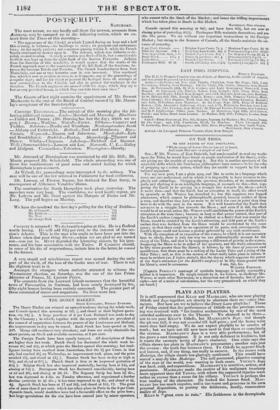ON THE TIDES.
TO TIIE EDITOR OF TIIE SPECTATOR.
"Whole troops of' heroes Greece Las yet to boast,
And sends thee one—a sample of our host."
SIR—If Mr. Woons, of East Dulwich, had condescended to read my works upon the Tides, lie would have found an ample confutation of his theory, with- out giving me the trouble of repeating it. But this is another specimen of the miserable shifts which the Newtonian philosophers have recourse to for the sake of propping up a rotten system, which they are unable to support by fair and rational argument.
For my own part, I am a plaits man and like to write in a language which
every one can understand, and in which is impossible to have recourse to du- plicity and subterfuge. Stripping the question, therefore, of its mathematical garb, and clothing it in an intelligible language, it amounts to this—that, sup- posing the Earth- to be moving in a straight towards the Moon—which it never does—and that the Earth had no attraction in itself, the effect would be precisely as Mr. Woons has described it; but this supposes. two begged admissions, which cannot be philosophically granted, because neither of them is true, and therefore they have no more to do with the case in point than they have to do with the man in the moon. It is well known that the Earth does not move in a straight line towards the Moon ; and even if it did, the effect would be of no avail, unless Mr. WOODS could annihilate the power of the Earth's attraction at the same time; because, so long as that power existed, that part of the Earth's surface (supposing it to be clothed in a fluid). that was nearest the Moon, would be retarded by the Earth's attraction, and that part of the Earth's surface that was furthest from the Moon would be accelerated by the same cause; so that there could be no separation of its parts, and, consequently, the Earth's figure could not become a prolate spheroid by any such contrivance.
With the exception of an expansion of the waters, to which it is not necessary
here to allude, there is only one way we can philosophically account for the rising of the Tides, and that is by stipposing a difference of gravity in the waters. Supposing the Moon to be-in either of her quarters and the Sun's attraction td be fifty times greater than the Moon's, it follows, ily. the laws of pressure and equilibrium, that there must be a sinking of the Lunar 'fides and a rising of the Solar Tides • and, as this is the reverse of what really takes place in nature, it must be evident (as I before stated), that the theory which supposes the power of the Sun's attraction (at the Earl/es surface) to be fifty times greater than the Moon's, must be erroneous. I am, Sir, &c.
WALTER FORMAN.
[ClipIaill FORMAN'S contempt of symbolic language is hardly reasonable; neither is it important. He simply intends by it, we believe, to challenge Mr. Woons, or some other Newtonian, to a discussion not of formulx, but of .prin- ciples—not of a series of calculations, but the very groundwork on which they are based.]



























 Previous page
Previous page